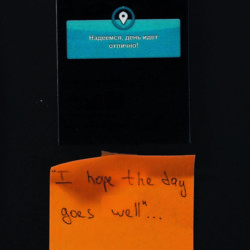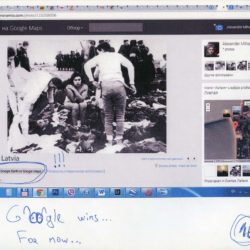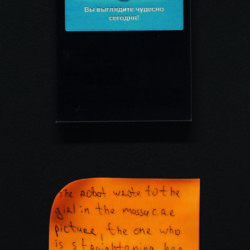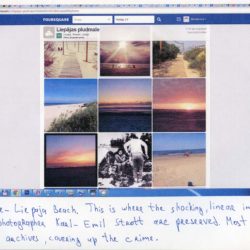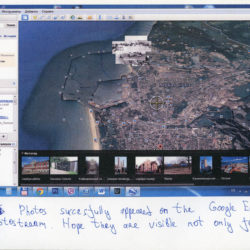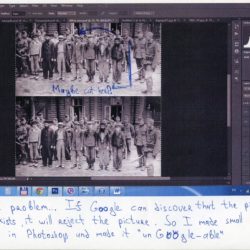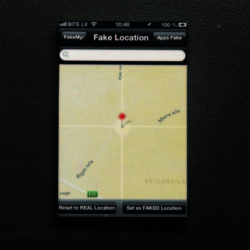
Exhibition: Alexander Mihalkovich. Forcing the Internet to remember the Holocaust
[spb_column width=»1/1″ el_position=»first last»] [spb_text_block pb_margin_bottom=»no» pb_border_bottom=»no» width=»1/1″ el_position=»first last»]
FotoDepartament Gallery presents:
Alexander Mihalkovich / Minsk
Forcing the Internet to remember the Holocaust
21 May — 30 June 2016
Opening reception: 21 May, 18:00
During the opening of the exhibition there will be a presentation of ‘PRAFOTA’ — a book on contemporary Belorussian photography (2015), Alexander Mihalkovich artist-talk ‘Personal experience as subject for new documentary storytelling. The circle of violence: an attempt of analyze the mechanisms of mass obedience’ and a showcase of his documentary films “Leave Permission” (2015) and “Tony’s Flyers” (2015).
Location: FotoDepartament, 24 Vosstaniya St. / «Fligel» Creative Space / 1st floor
Curator: Anna Shpakova
Entry is free
[/spb_text_block] [/spb_column] [spb_column width=»1/2″ el_position=»first»] [spb_text_block title=»About the project:» pb_margin_bottom=»no» pb_border_bottom=»no» width=»1/1″ el_position=»first last»]
The laws according to which the Internet lives today are moderated, invented by someone, adjusted to the average user. When searching for information that goes beyond the established limits, for the person it is not enough to have a mere desire. (S)he must be ready to trip over not just one bump of disinformation. I have set a goal to get around the laws, to deceive moderators and constantly vigil security systems, to show other pictures, to start an objective informal of the users.
I think people began to forget about the Holocaust. It is difficult to learn about it, if you are not specifically interested in this topic. People often attend the places where terrible things had been recently happening, and they have no idea about it. Having found some monstrous photographic evidence, I tried to remind people about the Holocaust in Latvia. I decided to bypass the security systems of popular photo sharing services on the map, such as Google Earth, Panoramio, and Foursquare, and add to the ordinary touristic or youth photofeed some photographic examples of the Nazis atrocities. My facts are black and white, they are terrible when seen by some girl who comes to the beach, gets “checked in” on “Foursquare” and suddenly sees a number of photos of executions.
Since the Internet giants possess an automated photo verification system, before I could make them available to the public, I had to look for ways to circumvent the system of protection. With the help of special programs, I changed the GPS information on the whereabouts of my smartphone, I also made some minor visual changes in the photos, trying to make them invisible for the verification system of copyright. My tricks were not always successful: after two days of moderation, Google Earth did not make my photos publicly available. Maybe at some stage of testing a robot got suspicious and sent the photos to a human moderator.
In the process of my experiment, I felt like Abba Kovner, a member of NAKAM — the terrorist group of Jewish avengers who was dreaming of revenge after the war and wanted to poison the water supply of Dresden. I am a terrorist, but for the sake of memory. I penetrate into your world of beautiful sunsets, kittens and photographs of food. I remind you of what is hidden under a layer of sand on the beach, where you sunbathe and “check in”.
[/spb_text_block] [/spb_column] [spb_column width=»1/2″ el_position=»last»] [spb_text_block title=»Curator Anna Shpakova:» pb_margin_bottom=»no» pb_border_bottom=»no» width=»1/1″ el_position=»first last»]
In his art, Alexander Mihalkovich is a provocateur and insurgent. He works on long-term projects, documentary films, audiovisual installations and performative arts using the elements of psychodrama.
The focus of Alexander’s works is the Past and the Memory, and theirs reflections in contemporary life. These topics are directly concerned with the exploration of time, intersection of time layers and representation of one time layer through another one.
According to Paola Paleari (Yet magazine, Italy), Mihalkovich’s projects deal with monumental concepts such as history or politics, collective memory and individual consciousness, technology and tradition – the areas so vague to grasp their scale and depth.
In his Forcing the Internet to Remember the Holocaust project the author examines the imprint of the past in our present. Mihalkovich is performing an act of the analysis of collective consciousness: he collides our loosing its memory society with unacceptable reminiscence, which are kept repressed.
The author tests the viewers and their safety margins of commonness and the conception of the vulnerability by clashing the concept of death with the consumption. By taking over the Internet Mihalkovich says: “I’m intruding into your world of sunsets, selfies, pets and instafood”. The author’s intent makes us explore the dark spots of our consciousness, have a deep insight into the history, which lies beneath us, and transform the present by revealing and re-introducing repressed past to the consciousness.
Anna Fox, professor of photography at the University for the Creative Arts at Farnham, UK, calls Mihalkovich a «cultural sniper», working with the hidden history.
The visual style chosen by the author helps him to explore the potential of photographic medium: the photography is tested for its viability in the Internet space. A thin surface of the Internet is disturbed by the author’s thoroughly planned interventions. “Tectonic” shifts in Latvian cultural and historical landscape dramatically change the visual surface of the Internet. Mihalkovich revises the Internet landscape so radically that it cannot but influence our consciousness. The past and the present clash and transform – this is the way author reminds us that the future is becoming our present.
Mihalkovich thinks in quite a postmodernist way: he explores penetration of one reality into another, and, in a broader sense, questions the existence of reality as such. Finally, the viewer cannot tell the true reality from the symbolic one, and the transition between the realities causes a viewer to feel uncertainty or even anxiety.
[/spb_text_block] [/spb_column] [spb_column width=»1/1″ el_position=»first last»] [spb_text_block pb_margin_bottom=»no» pb_border_bottom=»no» width=»1/1″ el_position=»first last»]
- Alexander Mihalkovich / Александр Михалкович
- Alexander Mihalkovich / Александр Михалкович
- Alexander Mihalkovich / Александр Михалкович
- Alexander Mihalkovich / Александр Михалкович
- Alexander Mihalkovich / Александр Михалкович
- Alexander Mihalkovich / Александр Михалкович
- Alexander Mihalkovich / Александр Михалкович
[/spb_text_block] [/spb_column] [spb_column width=»1/2″ el_position=»first»] [spb_text_block title=»About the author:» pb_margin_bottom=»no» pb_border_bottom=»no» width=»1/1″ el_position=»first last»]
Alexander Mihalkovich is based in Brussels, Belgium and Minsk, Belarus. He works on personal long-term photography projects, filmmaking, audiovisual installations and performance. Alexander is concerned about past and different historical issues which are connected with modern life. Anna Fox, professor of University for the Creative Arts at Farmhand (UK), calls Mihalkovich a «cultural sniper» working with the hidden history. According to Paola Paleari, editor of YET magazine, Mihalkovich’s projects deal with the monumental concepts such as history and politics, collective and personal memory, technology and tradition. He got his education in photography when attending a course of A. Polikanov, Y. Kozyrev and T. Plotnikova and Stanley Greene’s workshop (2013) and ISSP, Latvia (2014, 2015). Since 2014 he has been doing his Master’s course at LUCA School of Arts, Lusofona, SZFE. His photographs took part in exhibitions in Belarus, Latvia, Lithuania, Russia and Poland. His films was screened in Portugal, Hungary, Belgium, Belarus, Poland.
[/spb_text_block] [/spb_column] [spb_column width=»1/2″ el_position=»last»] [spb_text_block title=»On documentary movies by Alexander Mihalkovich:» pb_margin_bottom=»no» pb_border_bottom=»no» width=»1/1″ el_position=»first last»]
I met Alexander Mihalkovich towards the end of last year in Brussels during the international documentary workshop « Doc-Nomads » (Brussels, Lisbon, Budapest), in which I am also taking part as one of the teachers.
When I saw the two films that he’d made during is stay in Brussels for Doc-Nomads (« White Sheet of Paper » & « Leave Permission »), I at once thought of the writers Samuel Beckett and Eugene Ionesco. There’s no direct link, but perhaps something of an unconscious contamination, and he may not even be aware of it. No matter…
There’s something about his work that harks back to their sense of the absurd and ridiculous. Something of a theatralized austerity also, as in « Leave Permission ». It is a quirky, humorous world in which violence and frivolity are mixed together. A world where these ingredients collide, cross, get involved. He also shares their lean, no-frills quality and their sense of distanced and ironic coldness (maybe for him a mask to hide better behind, or a game certainly, nice game moreover…).
Meeting him, he exudes sensitivity, pessimism at human foibles. It is clear that violence and human stupidity are unbearable for him. He has besides a sharp sense of visual poetry (like in « Tony’s Flyers ») and minimalist composition (in particular in « White Sheet of Paper »). He has a certain sense of the rigor, and also the delicacy. Last but not least, he has that dry sense of humour which one takes to be Byelorussian (is that so ?).
Above all, for a documentary film-maker, he conveys empathy for the other one, a healthy curiosity and an acute sense of observation, mixed with a singular look on beings and things.
Beckett said thinking is about listening more hardly, and for Alexander thinking is about seeing more intensely, beyond appearances. He might well agree with the Pataphysicians’ statement : « I apply gladly to think of the things of which I think that the others won’t think about ».
Alexander was one of these serendipitous encounters that make international documentary film workshops worthwhile. After that, we breathe better and we smile…
Rogier van Eck
Film-maker and teacher at INSAS
[/spb_text_block] [/spb_column] [spb_column width=»1/1″ el_position=»first last»] [spb_text_block pb_margin_bottom=»no» pb_border_bottom=»no» width=»1/1″ el_position=»first last»]
This is a text block. Click the edit button to change this text.
[/spb_text_block] [spb_text_block pb_margin_bottom=»no» pb_border_bottom=»no» width=»1/1″ el_position=»first last»]
The exhibition is supported by DOC NOMADS Joint Master Degree in Documentary Filmmaking
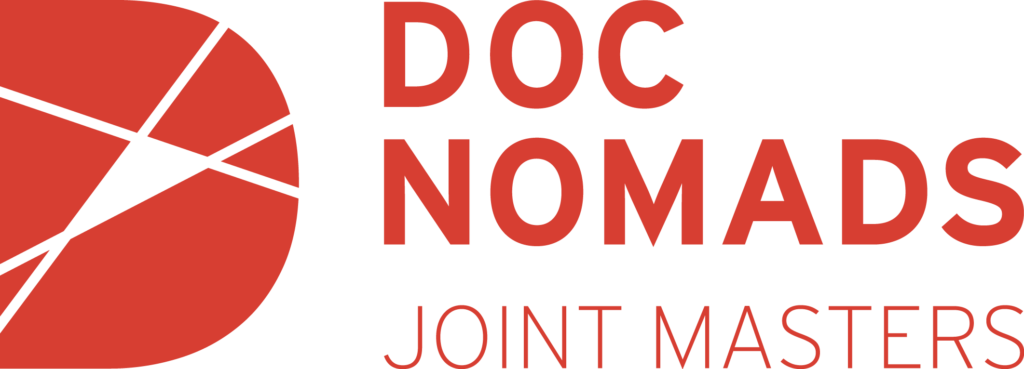
Press-accreditation:
tel.: +7 (901) 301-7994 /e-mail: press@fotodepartament.ru
FotoDepartament
Vosstaniya street, 24, 2d yard, ground floor
art-claster “Fligel”
Saint-Petersburg / Russia
tel.: +7-901-301-7994
info@fotodepartament.ru
www.fotodepartament.ru
www.store.fotodepartament.ru
www.fmagazine.ru
[/spb_text_block] [/spb_column] [spb_column width=»1/1″ el_position=»first last»] [/spb_column]

